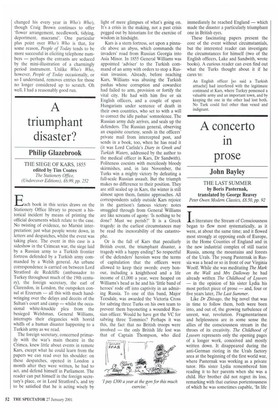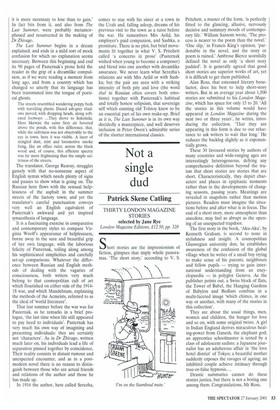A concerto in prose
John Bayley
THE LAST SUMMER by Boris Pasternak translated by George Reavey Peter Owen Modem Classics, £8.50, pp. 92 In literature the Stream of Consciousness began to flow most systematically, as it were, at about the same time; and it flowed most strongly at opposing ends of Europe, in the Home Counties of England and in the new industrial complex of still tsarist Russia, among the mountains and forests of the Urals. The young Pasternak in Russia was a head or so in front of our Virginia Woolf. While she was meditating The Mark on the Wall and Mrs Dalloway he had already written The Childhood of Lyuvers — in the opinion of his sister Lydia his most perfect piece of prose — and, four or five years later, The Last Summer.
Like Dr Zhivago, the big novel that was in time to follow them, both were born into, and out of, the growing turbulence of unrest, war, revolution. Fragmentariness and helplessness are in some sense the allies of the consciousness stream in the throes of its creativity. The Childhood of Lyuvers represents only the opening pages of a longer work, conceived and mostly written down. It disappeared during the anti-German rioting in the Urals factory area at the beginning of the first world war, where Pasternak was working as a private tutor. His sister Lydia remembered him reading it to her parents when she was a child. Her brother did not regret its loss, remarking with that curious portentousness of which he was sometimes capable, 'In life
it is more necessary to lose than to gain.' In fact bits from it, and also from The Last Summer, were probably metamorphosed and resurrected in the making of Dr Zhivago.
The Last Summer begins in a dream explained, and ends in a mild sort of mock confusion for which no explanation seems necessary. Between this beginning and end its 90 pages of Pasternak's prose hold the reader in the grip of a dreamlike compulsion, as if we were reading a memoir from long ago, and from a country which has changed so utterly that its language has been transmuted into the tongue of poetical ghosts.
The streets resembled wandering poppy beds with travelling plants. Dazed ash-grey shadows moved, with dropping heads, along softened footways ...They drove to Sokolniki. Here likewise the same fiery air hovered above the ponds, with this difference, that, while the sultriness was not observable to the eye in town, here it was visible. A layer of mingled dust, mist and locomotive smoke hung, like an office ruler, across the black wood and, of course, this efficient spectre was far more frightening than the simple sultriness of the streets.
The translator, George Reavey, struggles gamely with that no-nonsense aspect of English syntax which needs plenty of signs and pauses to show what is going on. The Russian here flows with the sensual helplessness of the asphalt in the summer streets of the factory town; and yet the translator's careful punctuation conveys very well an English equivalent of Pasternak's awkward and yet inspired synaesthesia of language.
It is a fascinating exercise in comparative and contemporary styles to compare Virginia Woolf's appearance of helplessness, borne away in the sure and beautiful grip of her own language, with the laborious felicity of Pasternak, toiling along among his sophisticated simplicities and carefully set-up comparisons. Whatever the difference between Russian and English methods of dealing with the vagaries of consciousness, both writers very much belong to that cosmopolitan cult of art which flourished on either side of the 191418 war, and which Mandelstam, explaining the methods of the Acmeists, referred to as the ideal of 'world literature'.
That last summer before the war was for Pasternak, as he remarks in a brief prologue, 'the last time when life still appeared to pay heed to individuals'. Pasternak has very much his own way of imagining and presenting individuals: they are certainly not 'characters'. As in Dr Zhivago, written much later on, his individuals lead a life of separation pinned together by coincidence. Their reality consists in distant rumour and unexpected encounter, and as in a postmodern novel there is no reason to distinguish between those who are actual friends and relations of the author and those he has made up.
In 1916 the author, here called Serezha, comes to stay with his sister at a town in the Urals and, falling asleep, dreams of his previous visit to the town as a tutor before the war. He remembers Mrs Arild, his employer's paid companion, and Sashka, a prostitute. There is no plot, but brief movements fit together in what V. S. Pritchett called 'a concerto in prose' (Pasternak wished when young to become a composer) and blend into one another with dreamlike assurance. We never learn what Serezha's relations are with Mrs Arild or with Sashka; but the pair are seen with a striking intensity of both pity and love (the word zhal in Russian often covers both emotions) together with Pasternak's habitual and totally honest solipsism, that sovereign self which cunning old Tolstoy knew to be an essential part of his own make-up. Brief as it is, The Last Summer is in its own way decidedly a masterpiece, and well deserves inclusion in Peter Owen's admirable series of the shorter international classics.























































































 Previous page
Previous page